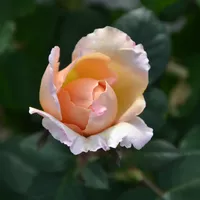La rosa y el sapo
Die Rose und der Frosch
The rose and the frog
La rosa y el sapo
La rose et la grenouille
De roos en de kikker
Había una vez una rosa roja muy hermosa, muy bella.
Es war einmal eine sehr schöne rote Rose, sehr schön.
Once upon a time there was a very beautiful red rose, very beautiful.
Había una vez una rosa roja muy hermosa, muy bella.
Il était une fois une très belle rose rouge, très belle.
Er was eens een heel mooie rode roos, heel mooi.
Qué maravilla al saber que era la rosa más bella del jardín.
Wie wunderbar zu wissen, dass es die schönste Rose im Garten war.
How wonderful to know that it was the most beautiful rose in the garden.
Qué maravilla al saber que era la rosa más bella del jardín.
Quelle merveille de savoir que c'était la plus belle rose du jardin.
Sin embargo, se daba cuenta de que la gente la veía de lejos.
Sie stellte jedoch fest, dass die Leute sie aus der Ferne sahen.
However, she realized that people saw her from afar.
Cependant, elle s'est rendu compte que les gens la voyaient de loin.
Однако она понимала, что люди видят ее издалека.
Un día se dio cuenta de que al lado de ella siempre había un sapo grande y oscuro y que era por eso que nadie se acercaba a verla.
Eines Tages stellte sie fest, dass neben ihr immer eine große, dunkle Kröte saß und dass deshalb niemand zu ihr kam.
One day she realized that next to her there was always a big dark toad and that was why no one came to see her.
Un jour, elle s'est rendu compte qu'à côté d'elle il y avait toujours un gros crapaud noir et c'est pourquoi personne ne venait la voir.
Однажды она поняла, что рядом с ней всегда была большая темная жаба и именно поэтому к ней никто не приходил.
Indignada ante lo descubierto le ordeno al sapo que se fuera de inmediato.
Outraged at what was discovered, she ordered the toad to leave immediately.
Indignée par ce qui a été découvert, elle a ordonné au crapaud de partir immédiatement.
Возмущенная обнаруженным, она приказала жабе немедленно уйти.
El sapo muy obediente dijo: “Esta bien, si así lo quieres.”
The very obedient toad said: "Okay, if you want it that way."
Le crapaud très obéissant a dit: "D'accord, si tu le veux comme ça."
Очень послушная жаба сказала: «Хорошо, если ты так хочешь».
Poco tiempo después el sapo paso por donde estaba la rosa y se sorprendió al ver la rosa totalmente marchita, sin hojas y sin pétalos.
A short time later, the toad passed by where the rose was and was surprised to see the rose completely withered, without leaves and without petals.
Peu de temps après, le crapaud passa là où se trouvait la rose et fut surpris de voir la rose totalement fanée, sans feuilles et sans pétales.
Через некоторое время жаба прошла мимо розы и с удивлением увидела, что роза полностью увяла, без листьев и без лепестков.
Y le dijo entonces: “Vaya que te veo muy mal.
And then he told him: “Well, I see you very badly.
Et puis il lui a dit : « Eh bien, je te vois très mal.
И тогда он сказал ему: «Ну, я тебя очень плохо вижу.
¿Qué te paso?”.
What happened?".
Qu'est-il arrivé?".
Что случилось?".
La rosa contesto: “Es que desde que te fuiste las hormigas me han comido día a día, y nunca pude volver a ser igual”.
The rose replied: "It's just that since you left the ants have eaten me day by day, and I could never be the same again."
La rose répondit : "C'est juste que depuis que tu es parti, les fourmis me mangent jour après jour, et je ne pourrais plus jamais être la même."
Роза ответила: «Просто с тех пор, как ты ушел, муравьи съедали меня день за днем, и я уже никогда не смогу быть прежней».
El sapo sólo contestó, “Pues claro, cuando yo estaba aquí me comía a esas hormigas y por eso siempre eras la más bella del jardín”.
The toad only answered, "Of course, when I was here I ate those ants and that's why you were always the most beautiful in the garden."
Le crapaud a seulement répondu: "Bien sûr, quand j'étais ici, j'ai mangé ces fourmis et c'est pourquoi tu as toujours été la plus belle du jardin."
Жаба только ответила: «Конечно, когда я была здесь, я ела этих муравьев, и поэтому ты всегда была самой красивой в саду».

